Malek Fady el Khazen founder of khazen.org on behalf of himself and his direct family convey their happiness in this great day and congratulates his Excellency President Of Lebanon General Michel Suleiman and wishes his success in the presidency and prosperity of Lebanon.
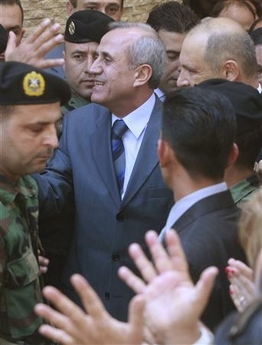 Lebanon’s Parliemanet elected army chief General Michel Suleiman as the country’s 12th president, filling a post left vacant for six months by a political crisis that threatened a new civil war. He was elected with a total of 118 votes and 6 blank copies. He won 118 votes of the 127 living members of the legislature on Sunday. Six cast blank ballots and one voted for slain ex-premier Rafiq Hariri and several MPs killed in Lebanon since 2005. One MP also voted for former MP Jean Obeid and another voted for majority MP Nassib Lahoud. After Suleiman was sworn in, the government of Prime Minister Fouad Siniora resigned in line with the Constitution but will stay on in a caretaker capacity. Suleiman arrived at Parliament shortly after the election accompanied by Speaker Nabih Berri, who left the Parliament building after the vote and returned with the newly elected president in line with protocol. Lebanon’s newly-elected President Michel Suleiman took his oath of office. "I pledge to respect and protect Lebanon’s independence, sovereignty and its constitution," Suleiman, who was greeted with heavy applause from lawmakers and guests, said.President Michel Suleiman’s inauguration speech was very positive. After taking the presidential oath, Suleiman delivered an inaugural address that dealth with several contentious issues. Previous addresses of this sort have tended to be vague, but this one was both comprehensive and specific in detailing the numerous daunting challenges facing this country. It was also forthright in acknowledging the issues that have recently divided Lebanon’s political parties. Perhaps most importantly, the new president clearly indicated – by both his choice of words and his tone of voice – that he intends to take charge of the reconciliation process. In short, Suleiman’s term in office has the potential to be the most important Lebanon has ever seen. The country has just passed through a long moment of high drama and mortal peril, and he will preside over a transition to the next phase. How he does so will help to determine what that phase looks like – and so whether Lebanon can begin at last to provide all of its citizens with the homeland they deserve. Tackling relations with neighbouring Syria, one of the many challenges his presidency will face, Suleiman called for the establishment of formal diplomatic links with Damascus. "We look strongly to brotherly ties between Lebanon and Syria in the context of mutual respect of the sovereignty and borders of each country and diplomatic ties which will bring good for both of them," the new president declared. "Let us unite… and work towards a solid reconciliation," the former army chief said after being sworn in before lawmakers. "We have paid dearly for our national unity. Let us preserve it hand-in-hand." "I call upon all of you, politicians and citizens, to start a new phase called Lebanon and the Lebanese… in order to achieve the interests of the nation," he said. He also added "On this path to salvation, some valiant resistance and some courageous soldiers also offered their lives in order to defeat terrorism, Israeli aggression from south
Lebanon’s Parliemanet elected army chief General Michel Suleiman as the country’s 12th president, filling a post left vacant for six months by a political crisis that threatened a new civil war. He was elected with a total of 118 votes and 6 blank copies. He won 118 votes of the 127 living members of the legislature on Sunday. Six cast blank ballots and one voted for slain ex-premier Rafiq Hariri and several MPs killed in Lebanon since 2005. One MP also voted for former MP Jean Obeid and another voted for majority MP Nassib Lahoud. After Suleiman was sworn in, the government of Prime Minister Fouad Siniora resigned in line with the Constitution but will stay on in a caretaker capacity. Suleiman arrived at Parliament shortly after the election accompanied by Speaker Nabih Berri, who left the Parliament building after the vote and returned with the newly elected president in line with protocol. Lebanon’s newly-elected President Michel Suleiman took his oath of office. "I pledge to respect and protect Lebanon’s independence, sovereignty and its constitution," Suleiman, who was greeted with heavy applause from lawmakers and guests, said.President Michel Suleiman’s inauguration speech was very positive. After taking the presidential oath, Suleiman delivered an inaugural address that dealth with several contentious issues. Previous addresses of this sort have tended to be vague, but this one was both comprehensive and specific in detailing the numerous daunting challenges facing this country. It was also forthright in acknowledging the issues that have recently divided Lebanon’s political parties. Perhaps most importantly, the new president clearly indicated – by both his choice of words and his tone of voice – that he intends to take charge of the reconciliation process. In short, Suleiman’s term in office has the potential to be the most important Lebanon has ever seen. The country has just passed through a long moment of high drama and mortal peril, and he will preside over a transition to the next phase. How he does so will help to determine what that phase looks like – and so whether Lebanon can begin at last to provide all of its citizens with the homeland they deserve. Tackling relations with neighbouring Syria, one of the many challenges his presidency will face, Suleiman called for the establishment of formal diplomatic links with Damascus. "We look strongly to brotherly ties between Lebanon and Syria in the context of mutual respect of the sovereignty and borders of each country and diplomatic ties which will bring good for both of them," the new president declared. "Let us unite… and work towards a solid reconciliation," the former army chief said after being sworn in before lawmakers. "We have paid dearly for our national unity. Let us preserve it hand-in-hand." "I call upon all of you, politicians and citizens, to start a new phase called Lebanon and the Lebanese… in order to achieve the interests of the nation," he said. He also added "On this path to salvation, some valiant resistance and some courageous soldiers also offered their lives in order to defeat terrorism, Israeli aggression from south
House Speaker Nabih Berri congratulated Suleiman and said "Reconciliation is an essential step for the revival of Lebanon." He also thanked Qatar for its efforts toward ending the Lebanese crisis. It is today a great day of hope for Lebanon, starting a new process of consolidation of democratic institutions," But he took a swipe at Washington, saying: "I thank the United States nonetheless, seeing that it seems to have been convinced that Lebanon is not the appropriate place for its New Middle East plan." He was referring to comments made by US Secretary of State Condoleezza Rice, who described the plight of Lebanon during Israel’s 2006 war against it as part of the "birth pangs of the New Middle East" Addressing the Lebanese parliament after the election, Al Thani said that Sleiman’s election was part of a process towards a lasting peace in Lebanon."The Lebanese [leadership], with its variety and diversity, acknowledged that there is no alternative but to reach an entente that will safeguard Lebanon’s security and interests," he said."All Arab nations will feel reassured that the dearest countires will be able to embark on a new era based on freedom. "Lebanon is the victor, Lebanon’s crisis is the vanquished." Members of parliament from the ruling majority and the opposition attended a parliamentary session at 5 PM to elect Suleiman as president, as stipulated by the Doha agreement. 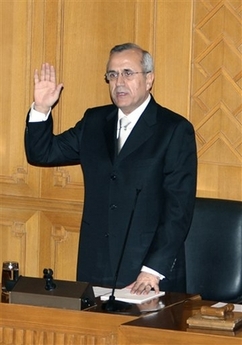 The vote had been postponed 19 times because of the crisis. It defuses a conflict that has stoked sectarian tensions, paralyzed government and battered the economy. Parliament has not met for more than a year and a half. Sunday’s vote was attended by Qatar’s emir and his prime minister, — the driving force behind the Doha agreement — It was also attended by the Prime minister of Turkey and a host of foreign ministers including those of arch-rivals Syria and Saudi Arabia, Foreign Minister from France, Spain, Iran, Italy, Turkey, Oman, Bahrain, Iraq, Kuweit, Jordan, Egypt, United Arab Emirates. A U.S. delegation of congressmen
The vote had been postponed 19 times because of the crisis. It defuses a conflict that has stoked sectarian tensions, paralyzed government and battered the economy. Parliament has not met for more than a year and a half. Sunday’s vote was attended by Qatar’s emir and his prime minister, — the driving force behind the Doha agreement — It was also attended by the Prime minister of Turkey and a host of foreign ministers including those of arch-rivals Syria and Saudi Arabia, Foreign Minister from France, Spain, Iran, Italy, Turkey, Oman, Bahrain, Iraq, Kuweit, Jordan, Egypt, United Arab Emirates. A U.S. delegation of congressmen
-
-
AFP via Yahoo! News – 16 minutes ago
-
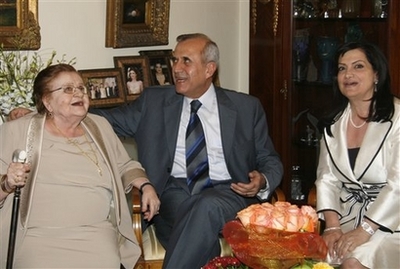
-
Army chief Michel Suleiman sits between his mother, left, and his wife Wafaa, right, in his house in Beirut, Lebanon, Sunday, May 25, 2008. Suleiman was sworn as Lebanon‘s president Sunday after parliament elected him in long-delayed vote that was a key step toward restoring political stability. (AP Photo)
-
-
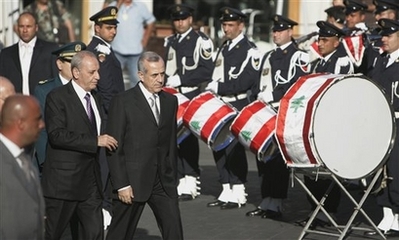
-
Newly-elected Lebanese President Michel Suleiman, center, is led by Lebanese Parliament speaker Nabih Berri, 2nd left, to the Lebanese Parliament in Beirut, Lebanon, Sunday, May 25, 2008. Lawmakers are scheduled to meet there Sunday to elect consensus candidate and army chief Michel Suleiman as president – a key step toward reconciling Lebanese factions after a long political crisis that has brought the country to the brink of all-out civil war. (AP Photo/Ben Curtis)
-
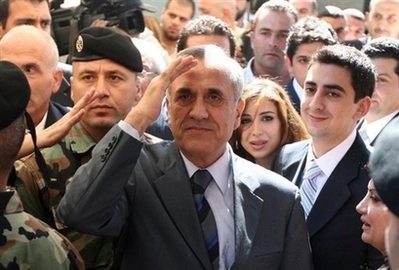
-
Lebanon‘s army chief Michel Sleiman (C) salutes people gathered at his family home in Feyyadieh, Beirut. Sleiman appealed for unity after being sworn in following a parliament vote that many hope will turn a new page in the crisis-ridden nation.(AFP/Joseph Barrak)
AFP via Yahoo! News – 12 minutes ago
-
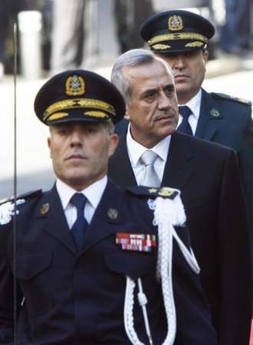
-
Newly elected President Michel Suleiman (C) reviews the honour guard upon his arrival to parliament in Beirut May 25, 2008. Lebanon‘s parliament elected Suleiman as head of state on Sunday, reviving paralysed state institutions after an 18-month standoff between a U.S.-backed cabinet and the Hezbollah-led opposition. REUTERS/Mohamed Azakir (LEBANON)
-

-
Lebanon‘s army chief Michel Suleiman greets his supporters outside his home in Fayadiyeh, east of Beirut May 25, 2008 before heading to Parliament. (Emile Dalal/Reuters)
Reuters via Yahoo! News – 11 minutes ago
-
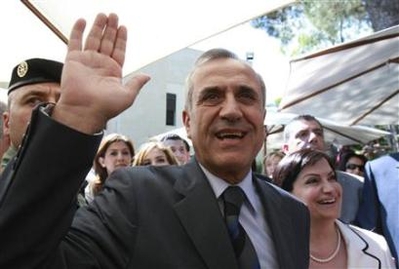
-
Lebanon‘s army chief Michel Suleiman waves beside his wife Houda outside their home in Fayadiyeh, east of Beirut May 25, 2008 before heading to Parliament. (Emile Dalal/Reuters)
Reuters via Yahoo! News – 12 minutes ago
-
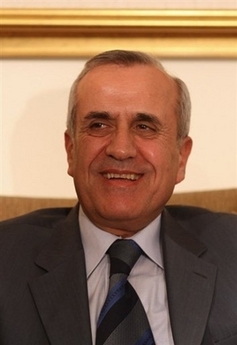
-
Lebanon‘s army chief and presidential candidate General Michael Sleiman smiles during a gathering at his family home in Feyyadieh, east of Beirut. Sleiman has been elected president by lawmakers in a first step towards ending a long-running political crisis between the Western-backed ruling coalition and the Hezbollah-led opposition.(AFP/Joseph Barrak)
-
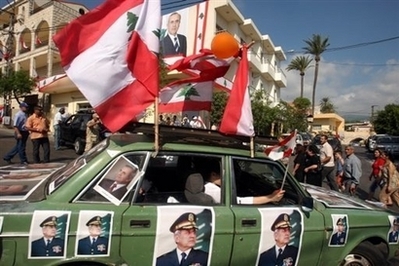
-
Lebanese celebrate the election of Lebanese army chief Michel Sleiman as president in his hometown of Amcheet in Lebanon. Lebanese lawmakers elected Sleiman as president in a first step towards defusing an often deadly 18-month standoff between feuding political factions.(AFP/Patrick Baz)
AFP via Yahoo! News – 23 minutes ago
-

-
Lebanon’s army chief Michel Sleiman (C) salutes people gathered at his family home in Feyyadieh, Beirut. Lebanese lawmakers have elected Sleiman as president in a first step towards defusing an often deadly 18-month standoff between feuding political factions.(AFP/Joseph Barrak)
AFP via Yahoo! News – 23 minutes ago
-
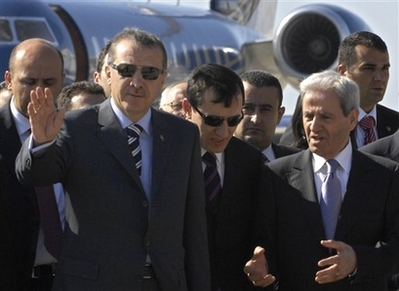
-
Lebanese Foreign Minister Fawzi Salloukh, right, receives Turkish Prime Minister Recep Tayyip Erdogan, left, as he arrives at the Rafik Hariri International Airport in Beirut, Lebanon, Sunday, May 25, 2008. Lebanon‘s parliament elected army commander Gen. Michel Suleiman as president in a long-delayed vote that was a key step toward reconciling political factions. (AP Photo/Ahmad Omar)
AP via Yahoo! News – 8 minutes ago
-
AFP via Yahoo! News – 9 minutes ago
-
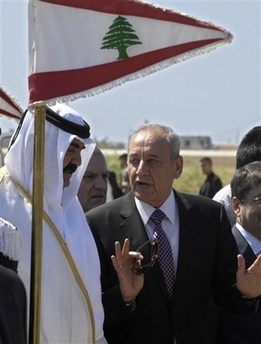
-
Lebanese Parliament Speaker Nabih Berri, right, receives the Emir of Qatar Sheik Hamad bin Khalifa Al Thani, left, as he arrives at the Rafik Hariri International Airport in Beirut, Lebanon, Sunday, May 25, 2008. Lebanese flags and pictures of army chief Michel Suleiman adorned streets Sunday as parliament convened in a session to elect the consensus candidate as president



